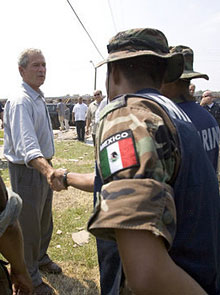 |
 |
 |
 Editorials | January 2007 Editorials | January 2007  
Aid to Mexico Helps U.S., Too
 Dallas Morning News Dallas Morning News


| | President George W. Bush greets aid workers from Mexico helping in hurricane Katrina's wake in Gulfport, Miss., Sept. 2005. (Paul Morse) |
When a Peruvian federal judge was gunned down as he lunched with a nephew near his office last summer, his murder was a big wake-up call about the power of Mexican drug cartels. Federal Judge Hernαn Saturno Vergara probably would be alive today if he had not been on a major case against alleged members of the Tijuana cartel, one of the five Mexican cartels believed to be bankrolling state-of-the-art cocaine processing labs in Peru.

Closer to home, the Tijuana and Gulf cartels are behind the escalating violence along the border, especially in South Texas, the leading port for cocaine.

That's why a group of Texas lawmakers all from border districts has filed a bill in the House seeking $850 million for federal aid to Mexico over five years. That may sound like a lot of money, but not when you consider that, for last year alone, Colombia received $561 million in U.S. dollars to combat narcotics cultivation and trafficking. Peru got another $146 million. Mexico, our neighbor and trading partner, received only $69 million.

Now that Mexican cartels are the dominant drug-trafficking organizations in the hemisphere, Washington must look for ways to stop these vicious empires from spreading. Already Mexican cartels are blamed for drug-related murders in North Texas. And despite recent federal deployments of military and police officials to Mexican border states, the violence continues to spread across the Rio Grande.

The aid bill introduced by Rep. Henry Cuellar, D-Laredo also calls for greater cooperation between U.S. and Mexico law enforcement agencies, especially when it comes to finding missing Americans. Included in the bill are plans to upgrade law enforcement technology and train judges and prosecutors handling drug-related cases, hopefully strengthening Mexico's judicial branch.

Some of the money would go to creating anti-corruption programs and for economic and social development, such as micro-lending and trade-capacity building, to address the chronic poverty that feeds the success of the drug wars.

These resources could give authorities in both countries the needed boost to build a solid partnership to whack away at the far-reaching tentacles of the drug cartels. | 
 | |
 |



